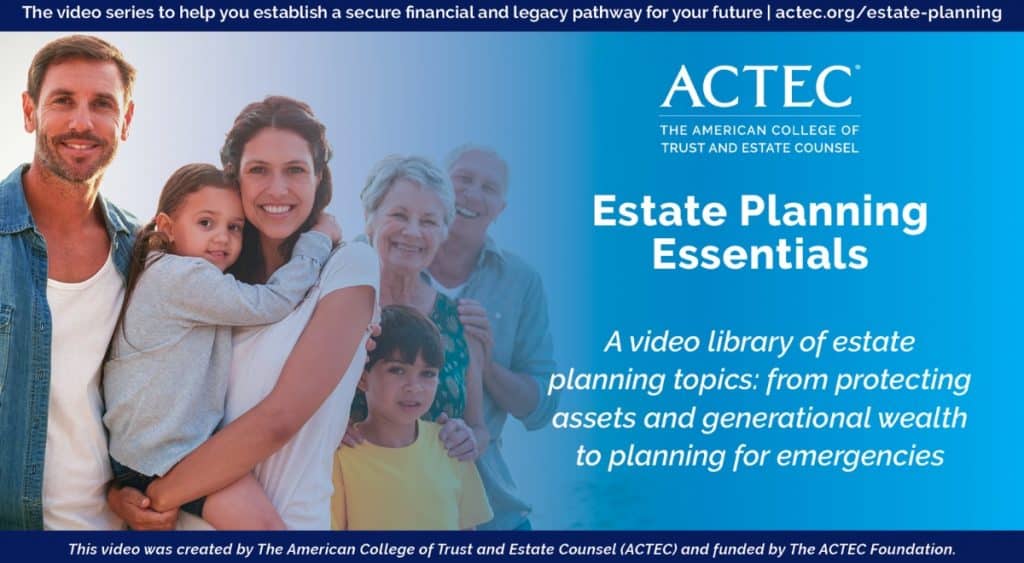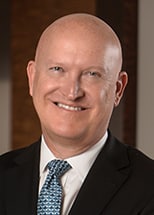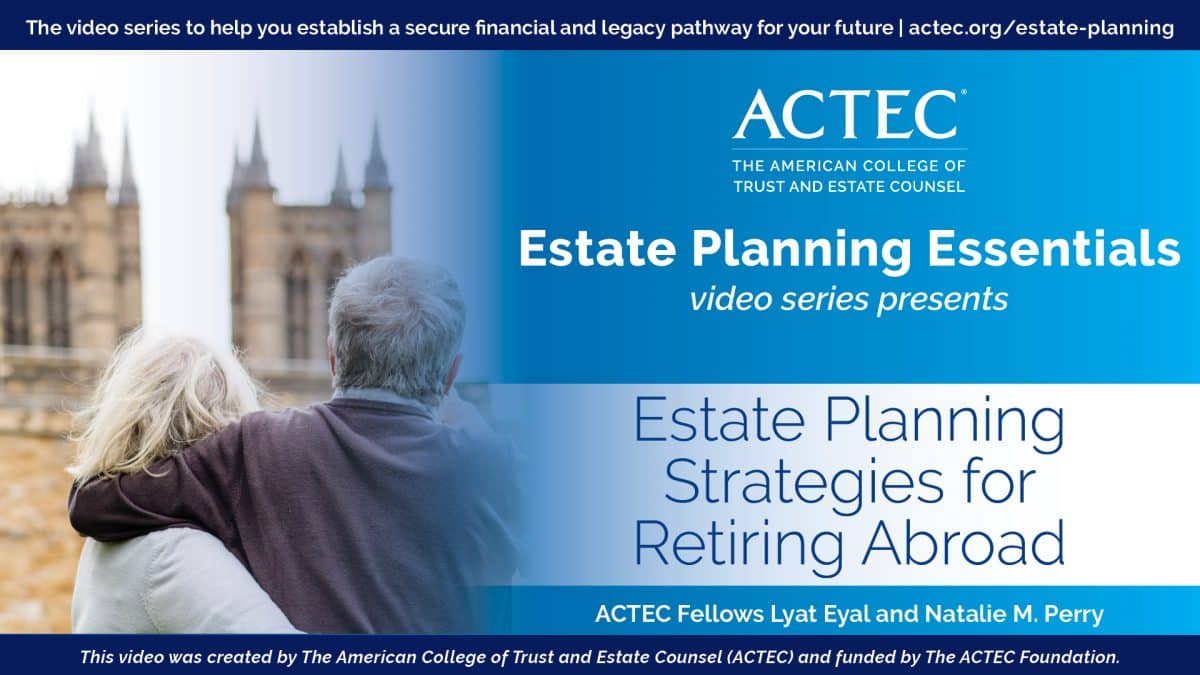Estate planning for freelance or gig workers involves effectively managing income, taxes, and assets. They must maintain meticulous financial records, prepare a will or trust, and designate beneficiaries. Additionally, critical documents like power of attorney and healthcare proxies are crucial for planning during incapacitation. Given the potential for remote work, considerations for state and international tax laws should also be addressed.
ACTEC Fellows Natalie M. Perry and Douglas Stanley offer recommendations to self-employed workers and explain what’s important to understand.
Resources
Relevant videos from ACTEC Estate Planning Essentials Library
Transcript
Hello, I’m Doug Stanley, an ACTEC Fellow from St. Louis, Missouri. I’m here today with Natalie Perry, an ACTEC Fellow from Chicago. Our topic today is estate planning for freelancers and the gig economy. Natalie, can you give us a little background on what is a freelance worker?
Description of a Freelance or Gig Worker
Natalie Perry: Yes, thank you, Doug. So freelance is a really a type of self-employment. And the individuals who are freelancers, they contract on either a per-project basis or maybe a per-task basis, depending on what it is they’re doing. They might work full-time or part-time if it’s just a smaller job. And typically, freelancers are not entitled to benefits, or they aren’t going to receive them from their employer like healthcare or retirement savings.
Also, oftentimes their income tax or payroll tax is not withheld by the employer. And in fact, the gig worker himself or herself is responsible for paying the estimated tax payments each quarter in order to pay into the payroll system so that they don’t owe an income tax burden and penalty at the end of the year.
Examples of freelance workers are writers, graphic designers, photographers, programmers, and salespeople, and what we call a gig worker could be someone who does ride share, a delivery driver, dog walkers, nannies, or childcare providers. Those types of roles also fall into the category of gig workers. And believe it or not, in 2022, over 36% of the US workforce stated that they were participating in freelance work.
Doug Stanley: That’s a big percentage. I have a better understanding of freelancing and even know some self-employed lawyers and other self-employed workers. What are the first things self-employed workers need to keep in mind?
Estate Planning Recommendations for Self-Employed Workers
Natalie Perry: So self-employed workers and gig workers, as we’re calling them, they need to keep very good records because they have to be very disciplined about keeping track of their income and paying in their income taxes.
If they’re contributing to a retirement fund for themselves, they will also need to be tracking their contributions so that they don’t exceed the minimums, which are set under federal law. And we’ve shared several videos in the library that get into these topics, so you should look for those as well.
Identify Assets and Create a Will or Trust
As to how to get started on the estate plan, they’re going to have to identify their assets, that’s step one, so that they know what they’re planning for. Then they’re also going to want to create a will and potentially some other documents, which we’ll get into in a minute. When they do a will, they need to think of who their executor would be. And that’s the person that’s going to distribute the assets for them when they pass away to the designated beneficiaries. They may also need to choose a guardian if they have minor children. That’s always included in a will for people with children who are under the age of minority, which can vary by state.
Sometimes people will create a trust instead of just a will, they’ll have a will and trust, they work together. And that is really situational. So, it’ll depend on what you’re trying to accomplish, what your assets are, and maybe whether you’re engaging in some tax planning overall.
They’ll want to name a beneficiary in their trust just like they would with a will. And in fact, they may want to name beneficiaries on some of their individual assets, such as an IRA account. Sometimes you might have a beneficiary named on your bank account for some reason. Perhaps you want that to go directly to a family member, or you may have a joint account with somebody who’s helping you pay your bills.
Doug Stanley: I’m sure next on your list would be power of attorney, healthcare proxy, living will.
Critical Estate Planning Documents That Plan for Incapacity
Natalie Perry: Right, so those are important in the event you become incapacitated. So, estate planning takes into account both someone’s incapacity, meaning you’re alive, just not able to manage your affairs, as well as when someone dies. So those documents you mentioned are a critical part of any estate plan because we want to plan for both situations.
Doug Stanley: I’d imagine these days, freelancers who work online can live anywhere. So, what should they keep in mind if they move to another state or a country for a better quality of life?
Freelancers Working Remote Tips
Natalie Perry: There’s a new term called “digital nomad” in addition to gig worker if you haven’t heard that phrase. And a digital nomad is someone who relies on technology so that they can be location independent.
So, this could be somebody living in a cold state and then goes away for six months in the winter to work remotely and enjoy the warmer weather. So, although they may live in a Midwestern state, for example, they’re working in Florida, let’s say or a sunshine state. And that person may have some additional things to plan for, whether it’s income tax in that other state they’re working in, or if they’re a resident of that warmer state, perhaps they’re having income tax in the state where their employer is.
So, there’s definitely some extra things to keep in mind there. And you also have to be aware of any estate tax complications if you’ve got assets in that state where you’re not a resident, or some people even move overseas and engage in work in the United States, but they may be living overseas. So that can also create some tax complexities that you want to be sure to plan for.
Doug Stanley: Well, that is definitely food for thought. Do you have any final thoughts?
Get Estate Planning Help from Professionals
Natalie Perry: Yes, I think it’s very important if you’ve got these issues to consult with an experienced estate planning attorney, someone who’s doing estate planning on a routine basis, who’s going to be aware of some of these concerns when they arise in the planning process.
There are resources online where you can do it yourself, but you have to be very careful with those, as they may not cover the same issues that an experienced planner would be aware of.
Doug Stanley: Thank you very much, Natalie.
Natalie Perry: Thank you, Doug.
Featured Video
Estate Planning Strategies for Retiring Abroad
Learn what retirement planning you need when moving overseas, such as document updates, guardianship considerations when moving with minor children, and more.
ACTEC Estate Planning Essentials

ACTEC Fellows provide answers to frequently asked trust and estate planning questions in this video series.



